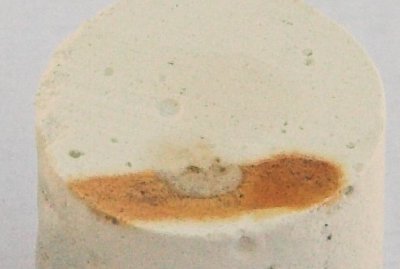How bad of evaporation do you get with 30 minute boils?
This time, I lost about 1.5L out of a 11L decoction. This was a 30 min boil and I added the water back after I used part of the decoction to infuse to the protein rest. If you plan to use all the decoction to get to a rest, add the water and wait for it to come to a boil again. Otherwise your decoction temp will be off (obviously).
Zoebish, sorry to hear that you had problems with your decoction. But let me try to address some of them:
I pulled the decoction after strike and proceeded to heat it to around 156 and let it start to convert and then boil it and add it. That went fine and I hit the target temperature exactly.
Good job hitting your target temp. This seems to be a common stumble-stone for most. But there is not need to match the saccrification rest temp when converting the decoction. Just heat to 160-164F, wrap the pot in blankets and let it sit for 10-20 min. After that it should be pretty much converted. Full of dextrines, but converted.
What did happen though I am not sure what took place. It took hours to convert, even to the point where I had to pull more decoction to restabilize my Saccharification rest temp. I had a lot of flour in it (I had adjusted the mill for the brew I did before that and forgot to retest before milling) and the last brew I had with a large amount of flour seemed to take forever as well to convert? I have no idea if that has anything to do with it.
Yes, this happened to me before. But I had a 100% Munich malt triple decoction for a Doppelbock. I ended up adding some fresh pilsner malt to get things going again. No fun. But you should have had quite a bit of the more enzymatic strong Vienna malt in there which helps. Here are a few tips:
- make decoctions thin mashes (1.75 - 2 qt/lb) and pull a thick decoction. Not to thick that it gives you problems when stiring it, but thick enough so you leave most of the liquid in the main mash. This is where the enzymes are.
- make sure you convert the decoction (10 - 20 min at 160-164F). These enzymes will be gone, so try to get the most out of them
- If the mash is not converted after 45-60 min at sacc rest temps, give it anothetr 30 min. Don't worry about the temperature droping. If you keep pulling decoctions and boiling them you are going to weaken the enzymes.
- If the mash still doesn't convert, pull your mash-out decoction to get you to a mash-out temp of about 164 F. This is prime a-amylase temp and should get things kick-started. Let it sit at this temp for 10 min and check conversion. You are not looking for a completely negative iodine reaction. Some color is still fine. It should just not be deep blue/purple. An reaction like this:
would be perfectly fine.
- after at most 30 min at this rest start recirculating until the wort runs reasonably clear and test a sample of that wort with iodine. If you only have a slight reaction, you are fine to go. I actually found that the mash may not show complete conversion, but when I then run-off into the kettle, the wort is converted. And that's what counts.
- If even the run-off after having the mash for 30 min at 164 shows a significant reaction to iodine, you are only left with adding more malt. 5-10% Pale or Pilsner should do it. If not, lauter and ferment a not fully converted wort. You could add Beano in the fermenter, but it would be hard to make it stop.
The other thing is I suppose the pH could have gone out of wack, but I am not set up to measure this.
Could have been the problem to if this was the first time you brewed a beer with that grist and the water you had.
Kai


















































![Craft A Brew - Safale S-04 Dry Yeast - Fermentis - English Ale Dry Yeast - For English and American Ales and Hard Apple Ciders - Ingredients for Home Brewing - Beer Making Supplies - [1 Pack]](https://m.media-amazon.com/images/I/41fVGNh6JfL._SL500_.jpg)







